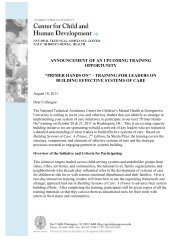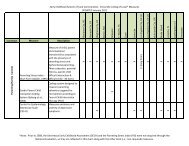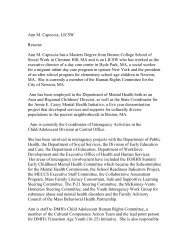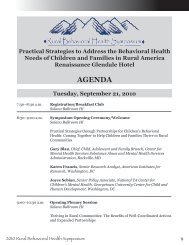Training Institutes 2012 - National Technical Assistance Center for ...
Training Institutes 2012 - National Technical Assistance Center for ...
Training Institutes 2012 - National Technical Assistance Center for ...
Create successful ePaper yourself
Turn your PDF publications into a flip-book with our unique Google optimized e-Paper software.
• Potential funding sources at the local, state, and federal levels to address early childhood mental health comprehensively<br />
• How to “get started” in developing a financing strategy using a financing mapping tool and process<br />
In addition to providing detailed and practical in<strong>for</strong>mation about effective financing strategies, faculty will encourage<br />
participants to share local funding challenges and will facilitate small group “solution sessions.” Participants will also<br />
be introduced to a finance mapping tool and guided through a process <strong>for</strong> using this tool effectively at home with a key<br />
group of stakeholders. Finally, participants will be provided with resources to support local exploration of potential<br />
funding sources. The faculty team <strong>for</strong> the session will offer the perspectives of a mental health agency administrator, a<br />
clinician, a family member/professional, and a mental health center director.<br />
MODERATOR/PRESENTER: Kathryn Shea, M.S.W., L.C.S.W., President & CEO, The Florida <strong>Center</strong> <strong>for</strong> Early<br />
Childhood, Inc., Sarasota, FL<br />
Steve Ambrose, Senior Vice President, Children’s Institute, Los Angeles, CA<br />
Tanya McCullom, Lead Family Coordinator, Early Connections, Alameda County Behavioral Health Care Service,<br />
United Advocates <strong>for</strong> Children and Families, San Leandro, CA<br />
Claudia Zundel, M.S.W., Manager, Early Childhood Mental Health Programs, Division of Behavioral Health,<br />
Colorado Department of Human Services, Denver, CO<br />
INSTITUTE #17 8:30 AM FRIDAY • 1:30 PM SATURDAY • ORANGE BLOSSOM<br />
Operationalizing a System of Care: A Curriculum and Toolkit<br />
OBJECTIVES—Participants will learn:<br />
1. To describe a curriculum and toolkit developed to guide interested communities in what it takes to create and sustain<br />
a system of care<br />
2. To identify the key components needed to get started on development of structure and funding of a system of care<br />
3. To explain the benefits and lessons learned from effective partnering with the family advocacy component of a<br />
system of care<br />
4. To apply the practice model of wraparound to guide system of care development and to support sustainability<br />
5. How to implement the necessary components to keep the wraparound practice model alive and well<br />
This Institute will focus on a strategy <strong>for</strong> operationalizing the system of care approach in communities. Faculty will<br />
present an overview of the “nuts and bolts” of a curriculum and tool kit developed by Wraparound Milwaukee in<br />
partnership with the Georgetown University <strong>National</strong> <strong>Technical</strong> <strong>Assistance</strong> <strong>Center</strong> <strong>for</strong> Children’s Mental Health to assist<br />
communities in developing their own local system of care. This package of training and corresponding materials can be<br />
tailored to the individual needs of communities choosing to learn how to begin, improve, or sustain system of care<br />
implementation ef<strong>for</strong>ts in their own localities.<br />
The Institute will provide participants with a program structure along with strategies to effectively finance the structure<br />
using Medicaid and blended dollars across systems. Lessons learned on effective partnerships and collaboration will be<br />
discussed, as well as methods to operationalize the values of the wraparound process and how to develop and sustain an<br />
effective work<strong>for</strong>ce.<br />
The in<strong>for</strong>mation and strategies to be presented are based on the experience of Wraparound Milwaukee, which was one<br />
of the original, federally funded system of care sites to develop a better way to serve youth and families. Wraparound<br />
Milwaukee has financially sustained itself over 16 years ago and has provided extensive training on how to build and<br />
maintain effective systems of care in diverse communities and states.<br />
Specific topics to be covered include:<br />
• An overview and possible uses of the curriculum and toolkit<br />
• Sample Modules #1 and #2: Structure and Finance<br />
• Sample Module # 4: Family and Youth Partnerships<br />
• Sample Module #5 and #9: Individualized Tailored Care and Quality Assurance<br />
<strong>Training</strong> <strong>Institutes</strong> <strong>2012</strong><br />
INSTITUTES<br />
49













